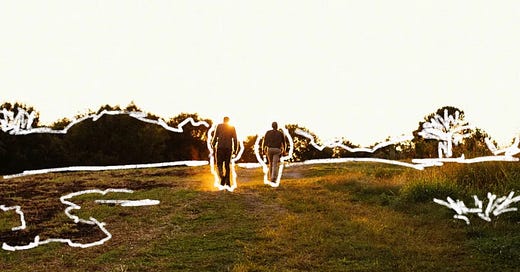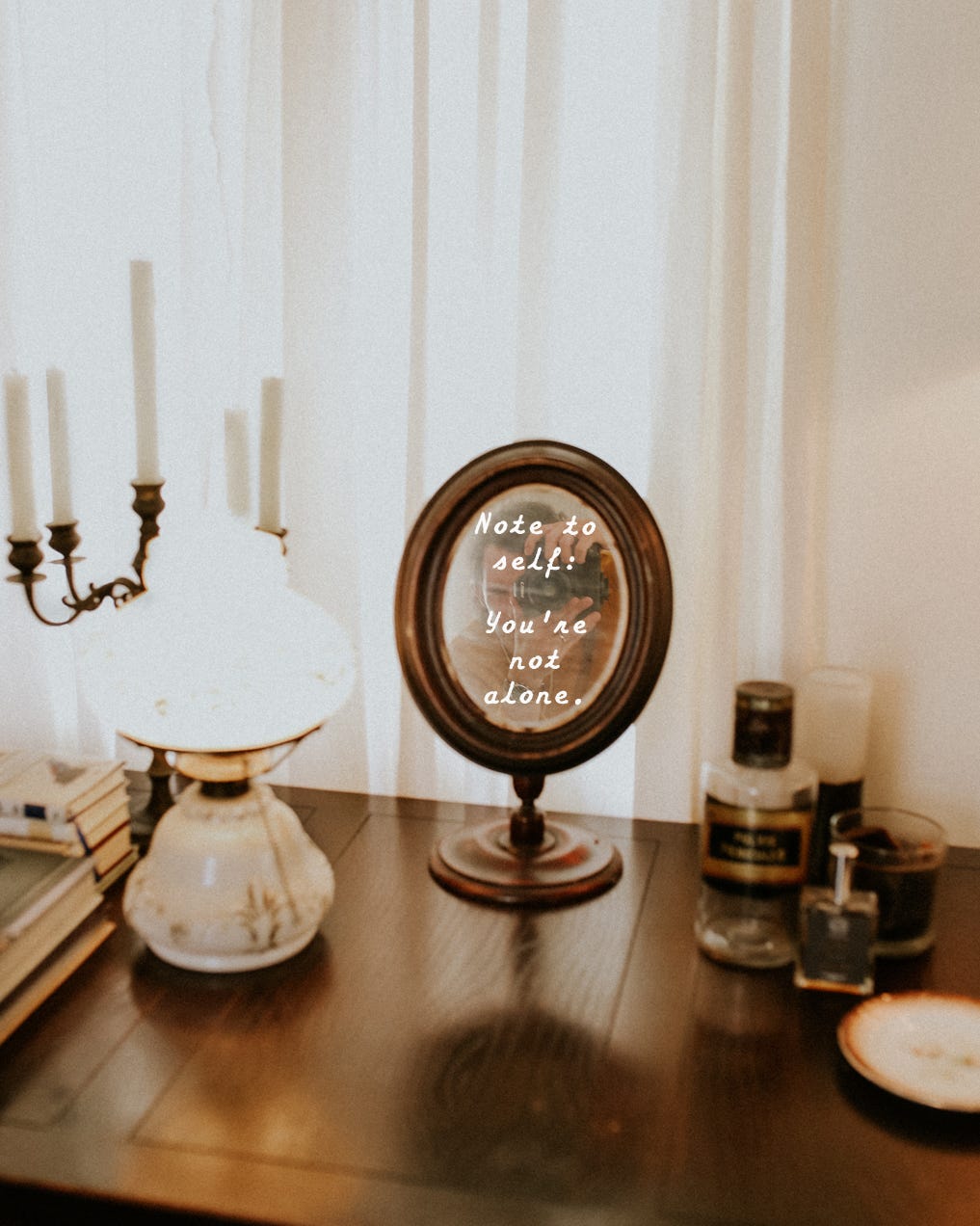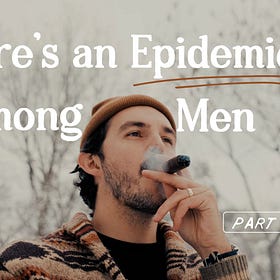There's an Epidemic Among Men
And it’s affecting our mental, physical, and spiritual health.
If you’re new here, welcome! Each week get evidence-based insights from a licensed therapist on healing attachment wounds, softening fear, and learning to trust again.
At the beginning of the therapy process with a new client, I assess many things, regardless of the presenting problem that has brought them to therapy. This includes what their life was like growing up in their family of origin, their attachment history, trauma history, medical history, and current life stressors. I’ll share a real example in a moment. One aspect I am always intentionally curious about is their social circles—namely, their friendships.
I work with men, women, and teenage boys, although the majority of my practice is comprised of men in their late 20s to late 40s, most of whom are married with families or dating. While the epidemic I want to address today is certainly not discriminatory—it affects us all—I want to focus on how it specifically pertains to men. The epidemic is loneliness.
I had a client, let’s call him Eric, who was 37 and married with three young children. Another client, whom we’ll call Joe, was 24 and single. Eric had worked for a successful company for 12 years and had transitioned into a leadership role in charge of a team of 12 people. He was focused on building his family and was enjoying a smooth rhythm in his career. Joe ran his own business in the creative industry and was concentrating on building both his career and friendships in a city full of talented creatives striving to make a living from their art. When I inquired about their friendships, both reported something similar—that they had “good” friends.
Eric had a few colleagues he considered friends, some guys from church, and his college roommates. Joe, on the other hand, had a large circle of creative friends in his age range, some of whom were married and others single or dating. It's important to note that “good” doesn’t mean much in the therapy setting; it’s often a filler word used automatically in response to a question. After working in this field for a while, I’ve learned that “good” could actually mask a more profound dissatisfaction. So, when I hear both of them say they have “good” friendships, I continue to inquire about its meaning. As we explored these relationships further, it turned out that for both of them, “good” actually indicated a significant deficiency of emotional intimacy.
Eric could talk with his colleagues about leading the team—not about how it was for him personally, but rather about the team’s performance. He could discuss theology at a cognitive level with his church group, and his college roommates would often hang out to watch football and compare their fantasy teams. Joe spent considerable time in coffee shops, creating art, and exploring with his group of friends. Yet when I asked which of these people they felt comfortable talking to about their depression, the anxiety keeping them up at night, or the childhood trauma they were addressing in therapy, they couldn’t think of a single person. If someone did come to mind, they quickly had convincing reasons for why they could not open up to them.
Eric and Joe are not outliers when it comes to this epidemic of loneliness. In America, friendship groups have significantly declined. A survey on friendships found that men have experienced a sharp decrease in close friendships. Thirty years ago, 55% of men had at least six close friends; now, only 27% do. Furthermore, the percentage of men with no close friends has increased fivefold. Women have also seen a decline, albeit less drastic; from 41% having six or more close friends in 1990 to 24% today, with 10% having no close friends. Men are also 3-4x more likely to commit suicide than women. Numerous factors contribute to this decrease: the busy lifestyles we lead today, digital communication, and shifting cultural and social norms. I could write an entirely separate article on how the pandemic has drastically affected friendships. However, for this article, I’m not referring to physical solitude; I’m talking about feeling lonely even when surrounded by others.
Returning to Eric and Joe, it’s not a lack of quantity in friendships. They have an adequate number of “friends” who could help them strive for more meaningful relationships and experiences in life. Yet they report feelings of loneliness, sadness, and a sense that something is profoundly missing.
There is a crucial difference between being alone and being lonely. Loneliness is an emotion that, like all others, tries to communicate something to us. It is neither inherently good nor bad; instead, it indicates that we lack connection and intimacy—two fundamental human needs. When someone asks, “How are you doing?” and you respond with, “Oh, I’m good!” but the truth is that you are not good at that moment, you will inevitably feel lonely. This discomfort arises from a lack of genuine connection and intimacy. There are many ways people react to feeling lonely, but there are two primary responses I observe among the men I work with: A) Isolate/Withdraw and B) Achieve/Perform.
A) Isolation/Withdraw
Often, men will withdraw in the presence of others. I like to say it’s as if the lights are on, but nobody is home. He may not leave the room; in fact, he may be sitting on the couch right next to you, but he feels a million miles away—and it’s because he truly is. He’s a million miles away from himself, and he might not even be consciously aware of this because of how his nervous system instinctively reacts to “protect” himself.
B) Achieving/Performing
If he’s not withdrawing, he might strive to achieve or perform in an attempt to get his needs met. Lacking deep connection, he reacts by performing in social situations, becoming someone he’s not, in an attempt to gain connection. Alternatively, he buries himself in work, believing that maybe, just maybe, if he achieves more, he might feel love and appreciation.
Both withdrawal and performance are attempts to evade or avoid the painful feeling of loneliness itself.
These reactions often occur in the subconscious mind for a reason. Likely, when he felt lonely as a child, withdrawing or performing helped him feel safe. This behavior creates an illusion of connection; to be alone in the feeling of loneliness can feel like death itself, so settling for a facade of connection becomes the route we often take.
There are several contributing factors to the epidemic of loneliness, such as the drastic change in the quantity and quality of relationships, or our primary form of interaction being digital. However, at a fundamental level, it’s about something much deeper: for many of us, we were left to navigate our loneliness, alone.
It is entirely normal for a child or adolescent to experience loneliness. After all, we are human, and we will, at times, miss each other, creating feelings of loneliness. Our caregivers—friends, teachers, coaches, and others—cannot meet all our emotional and relational needs when we are young. However, it is our caregivers' responsibility to help us recognize our feelings of loneliness and show us how to respond to those feelings and move toward what is meaningful.
Unfortunately, too many people have an opposite experience; their feelings of loneliness are ignored by their caregivers or are minimized or shamed. This often happens because the parents themselves do not have a healthy relationship with their own feelings of loneliness. Consequently, the child or adolescent reacts to that feeling rather than responding intentionally, acting out of survival instincts.
This pattern lays a fragile foundation for an adult man who is emotionally underdeveloped. He might have a successful job, a family, and a number of friendships, yet he is disconnected from the depths of his own soul. As a result, others miss the privilege of witnessing and caring for the pain, and beauty, that lurks within.
When I discuss a feeling with a client, such as loneliness, and ask them what they want to do with that feeling or what they hope will be different, I often hear “I don’t know” in response. Sometimes, it’s true that we genuinely don’t know, but I suspect this isn’t the case most of the time. A more accurate answer seems to be, “I want to do this, but I don’t think I can, or I’m too afraid.”
You see, we are wired for connection. The desire to connect and to be fully seen and known by another is woven into the fabric of our being. Our stories and traumas create strategies of avoidance, but at our core, we possess an instinctive intuition that pulls us toward one another. However, it’s often a reactionary response that drives us away because we reject or ignore that intuition, the same way it was rejected or ignored by those who should have listened.
As men, our responsibility is:
To become deeply aware of how our desire for connection was rejected
To recognize the ways we continue to reject that desire
To actively move toward meaningful connection in the safe relationships we have today.
One avenue for becoming aware of and healing from how that desire was neglected, is through therapy. I know—surprise, surprise—a therapist recommending therapy! I’ll just say I didn’t even know this was a core part of my story until I discovered it in therapy. If any part of what I’ve shared resonates with you, I encourage you to pay attention to that. It might be time to explore whats stirring within.
Another avenue is to lean into the safe relationships you currently have. Let this serve as a reminder that you likely have people in your life right now—safe people—who genuinely want to connect with you, whether they be your partner, mentor, friend, or family member. I once had a client who participated in a yearly men’s fishing trip with a group of friends that had been ongoing for over a decade. He was dealing with some issues that we were addressing in therapy, and I encouraged him to be honest about it during the trip and allow his friends to share in his experience. He was scared at first, but he leaned into that desire for connection, and to his surprise, he set the tone for a trip unlike any they’d had before. A handful of other guys on the trip opened up about their struggles, conversations they likely wouldn’t have shared if he hadn’t led with vulnerability. I believe it was Brené Brown who said, “Vulnerability breeds vulnerability.” Trust me, the people in your circle long for the same deep connection you seek; it just takes one person to open the door. Don’t wait around for someone else to do it.
I once heard psychiatrist, author, and leading voice of Interpersonal Neurobiology (IPNB) Curt Thompson say, “The brain can do really hard things when it knows it isn’t alone.” Your loneliness isn’t bad or wrong. It can be a gift if you allow it to be, for it can guide you toward the connection you desperately long for. If that belief is difficult for you to hold because your story tells you otherwise, I’m genuinely sorry. I truly understand how painful that is.
I’m speaking to myself as I write this letter. I have also come to believe that my loneliness is a sacred experience, not something I need to evade or ignore. It’s an invitation to move toward connection and intimacy within the presence of safe others—an experience that can be difficult to articulate. I wish for that same deep connection for you and for the men in your life.
I invite you to reflect on your own journey with loneliness and the desire for connection. Think about who in your life could benefit from a deeper conversation, a shared moment of vulnerability, or even just a simple check-in. There is profound strength in opening up, both for you and for those in your circle, as it fosters a sense of belonging that we all crave. Also sit with this question— How is God pursuing you in your loneliness?
I encourage you to take a step this week—reach out, share your thoughts, or express your feelings with someone you trust. Like, really let them in. Your voice matters. Your experience matters. Share your experiences, insights, or any questions you might have in the comments below. And if you’re still reading this, share this with the men in your life. Lets continue to move toward more meaningful connections within our lives.
With care,
Blake
Read More:
Why Men Are Lonely: The Crisis, the Causes, & How to Reconnect
Part 2 - In December, I made a post titled “There’s an Epidemic Among Men: And it’s affecting our mental, physical, and spiritual health.” At the time of writing this, if you’re interested in data at all, that post has experienced 38x the reach and engagement compared to my average post. This is something we must be talking more about. Too much is at stake if we don’t.
To my 17yr. old self who attempted suicide.
Blake,
I experience many emotions when I think about you. I feel grateful that your attempt wasn't successful. I feel angry—not at you, but at the reality of life at that time. And I feel deeply sad. I feel sad for you and with you.
20 Things I've Learned as a Therapist
If you’re new here, welcome! From a therapists office to your inbox - More to the Story helps you take your mental health, relationships, faith, and creativity seriously through personal essays and clinical perspective.
Start Here ↓
This a newsletter, an invitation, a guide, a community, an experience. A space that encourages you to journey inward and move towards wholeness. We’ll candidly explore the nuances of topics such as mental health, parenting, addictions, relationships, faith, creativity, trauma.











Just a gentle reminder that if you wrote a book I would
1. Buy it.
2. Read it.
3. Share it with my friends.
Thanks for writing and encouraging. You're great at both, dude.
Heartening and smart, thanks for this piece. You are very right to suggest that most have some acquaintances who could become friends. I’m 70 now and cherish my small friend group more and more, although death has begun to thin their ranks. I see more of my peers making an effort to stay closer as we age, especially those of us who are single. One nice thing is that by this age, no one has anything to prove — no dick-measuring or one-upmanship needed. If guys would just take the first step, they might find a real hunger for friendship among those they know. And don’t forget women — they are happy to be able to have males in their life who are not hitting on them or acting like horndogs.